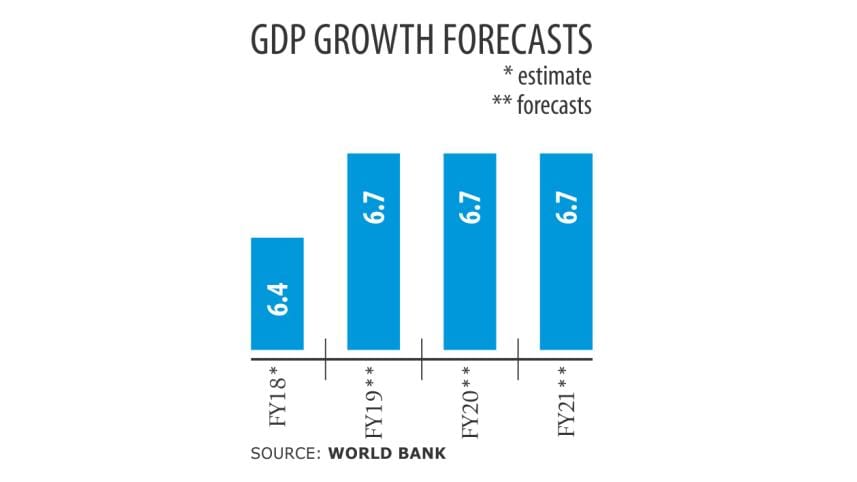Economy to stay strong

The World Bank has painted a brighter picture for Bangladesh's economy for the next two fiscal years, pinning hopes on strong domestic demand, exports, investment and remittance.
The Global Economic Prospects, a flagship report of the World Bank Group, said activity in Bangladesh would grow at an average of 6.7 percent a year over fiscals 2018-2020, benefiting from strong domestic demand and strengthening exports.
"Low interest rates and improved infrastructure are expected to lift investment," said the report, which was unveiled globally on Tuesday.
Remittances are expected to rebound as growth firms up in Gulf Cooperation Council countries, the report said.
Bangladesh is among the top 17 out of 134 countries in the list of GEP forecasts that are projected to have a growth rate of 6.4 percent or more in 2017-18, said Zahid Hussain, lead economist of the World Bank's Dhaka office.
The government has set a target of 7.4 percent GDP growth for the current fiscal year.
Recently, Finance Minister AMA Muhith said the gross domestic product may grow by 7.5 percent.
But Hussain said, "Achieving the government target of 7.4 percent growth this fiscal year will be challenged by banking sector vulnerabilities, infrastructure deficiencies, uncertainties in the run up to elections, and the slow pace of structural reforms."
The Bangladesh economy is projected to grow 6.4 percent in 2017-18. The government's Seventh Five-Year Plan aims to achieve 7.4 percent GDP growth annually for 2015-16 and 2019-20.
The WB report said commodity importers across Asia continued to register solid growth, in line with potential rates, supported by robust domestic demand and strengthening exports. According to the report, the growth remained strong in Bangladesh despite disruptions related to floods.
Main downside risks to the outlook for Bangladesh include fiscal slippages and a setback in implementation of reforms to improve corporate and financial sector balance sheets.
In South Asia, growth slowed to an estimated 6.5 percent in 2017, marginally below the June 2017 forecast owing to temporary disruptions from adverse weather conditions across the region.
Elevated credit growth continued to support investment in some countries, including Bangladesh and Pakistan.
About the risk confronting the countries, the report said the main risks to the outlook are domestic. Current account deficits gradually widened across the region, including in countries such as India, Bangladesh and Pakistan.
Balance sheet weakness for corporate—for example in India—and financial sectors—for example in Bangladesh and India—continued to weigh on private investment, the report said.
Corporate debt overhangs and high levels of non-performing loans have been long-standing concerns in some countries, including Bangladesh and India.
"Setbacks in efforts to resolve these domestic bottlenecks would continue to weigh on investment, and more broadly on medium-term growth prospects in the region."
Slippages relating to upcoming elections and weak tax revenues (e.g., Bangladesh, Nepal and Pakistan) could derail fiscal consolidation efforts, said the WB.
Remittance inflows have been subdued recently due to fiscal consolidation and growth slowdowns in the Middle East, which constitutes roughly half of remittances to South Asia. A protracted slowdown in remittance inflows would weigh on domestic consumption in countries such as Bangladesh and Sri Lanka.
Bangladesh's remittance earnings dropped to a six-year low to $13.53 billion in 2017 as many expatriate Bangladeshis sent money home through illegal channels.
The WB said the global economy is experiencing a broad-based cyclical upturn, which is expected to be sustained over the next couple of years, although with downside risks.
In contrast, growth in potential output (full-employment output) is flagging, languishing below its longer-term and pre-crisis average both globally and among emerging market and developing economies.
"The forces depressing potential output growth will continue unless countered by structural policies," the World Bank said.



 For all latest news, follow The Daily Star's Google News channel.
For all latest news, follow The Daily Star's Google News channel.
Comments